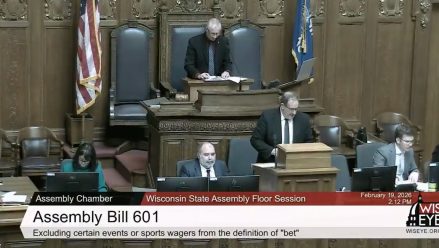Florida Attorney General James Uthmeier’s office filed a motion last Wednesday to dismiss a Leon County Court case that claims the state and Seminole tribe violated Amendment 3 when they expanded gaming in 2021. In the filing, the AG argues that the plaintiff, “Protect the Constitution LLC,” not only lacks standing, but also does not claim that it has been “adversely affected” by gaming in Florida and does not clearly state a claim.
At issue is the legality of the Seminole Tribe’s gaming monopoly and right (as granted by the state) to offer statewide digital sports betting through its Hard Rock Bet platform. It’s unclear who is behind Protect the Constitution. In the original April 23 filing, Protect the Constitution lawyers wrote that “each member of Protect the Constitution LLC offers products in the State of Florida and has suffered harm, including reduced revenue, as a result of the legislation purporting to authorize ‘casino gambling’ throughout the state.”
But none of the entities have been identified yet.
Protect the Constitution could be any assortment of entities, though West Flagler and Associates (WFA), who sued the U.S. Department of the Interior (DOI) and the state and lost in federal and state court, is likely not the plaintiff. Last October, it partnered with the Seminoles for betting on jai alai. As part of the agreement, both parties agreed to “refrain from engaging in any future litigation with respect to the Seminole tribe’s gaming operations.”
State: We’re within the rules of IGRA
In the filing, the AG argues that “Amendment 3 exempts from this citizen-initiative requirement gaming conducted under an (Indian Gaming Regulatory Act) IGRA compact. It states that nothing in it ‘limit[s] the ability of the state or Native American tribes to negotiate gaming compacts pursuant to’ IGRA ‘for the conduct of casino gambling on tribal lands,’ or to ‘affect any existing gambling on tribal lands pursuant to’ IGRA compacts.”
In the lawsuit, Protect the Constitution claims that the state and the Seminole Tribe violated Amendment 3 (now Article X, Section 30 of the state constitution) when they compacted for an expansion of gaming in 2021. Amendment 3, passed in 2018, reads that any expansion of gaming must go to the voters. But in 2021, the tribe and state compacted to add digital sports betting as well as craps and roulette at retail casinos. The state legislature then passed legislation accepting the compact. There was no ballot referendum or initiative sent to voters.
A critical section of the compact is language that deems any bet placed in the state of Florida to be placed in Indian Country if it flows through a tribal server. Considered a kind of “magic language,” the Seminoles are the only tribe so far to have a state sign off on this idea. Tribes in some other states, including Arizona, Connecticut, and Michigan, do offer statewide digital sports betting through commercial partners, but they are regulated and taxed by the state.
Did plaintiff sue the wrong parties?
As part of the compact, the tribe is required to pay the state $2.5 billion over the first five years of its existence in exchange for exclusivity to Class III gaming. There is opportunity for the state’s parimutuels or other commercial operators to partner with the tribe, but at a steep revenue share — parimutuels would pay the tribe 40% of revenue and, per IGRA, commercial operators would pay 60%. Gambling in Florida is regulated by the tribe, not the state.
This challenge is not the first. WFA, owner of Florida parimutuels, sued the DOI in federal court in 2021. A U.S. District Court found in WFA’s favor, and the Seminoles in November 2021 had to pull down their Hard Rock Bet platform. But a U.S. Appeals Court overturned that ruling, and the U.S. Supreme Court declined to hear an appeal, meaning that the appellate court ruling stood, and Hard Rock Bet has been live since November 2023. WFA later sued the state in Florida Supreme Court, but that court declined to hear the case because it said it was improperly filed.
Besides making the argument that Protect the Constitution lacks standing and cannot show harm, the state also wrote that the entity named the wrong parties — in particular, the Florida Gaming Control Commission. The state also points out that the Seminole Tribe is an “indispensable party” to the case that Protect the Constitution cannot join.
“Plaintiff has also failed to join an indispensable party, necessitating dismissal,” state lawyers wrote. “Under Rule 1.140(b)(7) of the Florida Rules of Civil Procedure, the Court may dismiss an action for the ‘failure to join indispensable parties.'”
Difference of opinion on ‘casino gambling’
The state also points to the definition of “casino gambling” as a reason to dismiss the case. In some cases, “casino gambling” does include sports betting, but under IGRA and some state laws that pre-date digital gaming (or the internet), sports betting — and in particular digital sports betting — is not explicitly mentioned. In addition, the state argues, for something to be considered “‘casino gambling,’ it must be both within the types of games ‘[1] typically found in casinos and [2] that are within the definition of Class III games’ under IGRA, as defined (by the statute and regulation) when the amendment was ratified and as defined by those sources in the future.”
The state argues that because sports betting “is not typically found in casinos” — or was not at the time that IGRA was written — it does not qualify as a casino game. When IGRA was written in 1988, sportsbooks were only legal in Nevada, and in-person casinos were available on a limited basis elsewhere. Retail sportsbooks are now available in more than 35 U.S. jurisdictions.
Finally, that state argues that because digital sports betting is included in the compact, which falls under IGRA, that there was no reason to go the voters. At its writing, IGRA did not explicitly entertain the idea of digital betting because it did not exist. But in 2024, the Bureau of Indian Affairs — tasked with interpreting the law — released updated guidelines that do include digital gambling.
And in WFA’s federal lawsuit, the “D.C. Circuit held that the off-reservation sports-betting provisions were permissible to include in the compact and thus were a permissible subject of compact negotiations under IGRA. As the D.C. Circuit explained, the compact provisions allowing for ‘wagers placed from outside Indian lands’ were lawfully included because they are ‘directly related to the operation of’ the Tribe’s gaming activities on tribal lands.”





